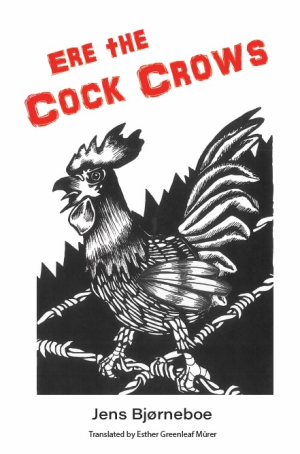Ere the Cock Crows
Ere the Cock Crows is a thoughtful and affecting novel about the psychological impacts of Nazism.
Two men wrestle with the complexities of morality, ethics, and duty in Jens Bjørneboe’s novel Ere the Cock Crows. This first English translation of the novel includes a recreation of the lost dramatic work upon which the novel was based, as well as an essay by translator Esther Greenleaf Mürer on the challenges presented by her recreation; she nods to disputes regarding where the play started, and what pieces of it, if any, were rearranged to befit its novelization. Here, the novel, play, and essay operate together to contextualize the work in its original post-war form, as well as in its new form.
In the story: an unnamed man picks through the bombed-out ruins of buildings in post-war Germany, following an old woman to a rooftop apartment inhabited by three disabled people. Its residents include Max, who is unhinged and of particular interest to the man. He returns to the squalid apartment several times; Max tells him a story about Nazi doctors and SS figures whose names are familiar to him. One such doctor was responsible for carrying out hundreds of experiments in a concentration camp where Max was a guard.
But Max’s version of events isn’t the whole story, and missing, vital information comes to the unnamed man by chance. The doctor in question, and the SS commandant who leads the camp, were childhood friends; also their friend was Goldmann, a Jewish boy. Goldmann’s presence in the camp, and his appearance on the list of people upon whom the doctor could experiment, set the doctor and the commandant on opposing paths.
The story concentrates on introducing Max first; it also introduces Lyngby, a survivor of the camp. Max’s part is small overall, but he still anchors the novel, whose beginning chapters are long and heavy on exposition, but also vital to understanding the whole story. The text then shifts, taking cues from the drama that inspired it; it is dominated by interactions between the commandant and the doctor. Both are self-aware to remarkable degrees, sharing their reasons for joining and working for the Nazi party; still, the doctor’s cognitive dissonance requires sorting. He strives to keep his family and scientific lives separate; at his opposite, the commandant shows complete disregard for his personal ethics. He values the money, power, and respect of his position more.
The book’s switches in tone and narrative style are abrupt, as is acknowledged in Mürer’s essay. Still, the story is effectively told, with swelling tensions and a descending, dark mood. The push and pull between morality and duty dominates its latter portions, helping to make Ere the Cock Crows a thoughtful and affecting novel about the psychological impacts of Nazism.
Reviewed by
Dontaná McPherson-Joseph
Disclosure: This article is not an endorsement, but a review. The publisher of this book provided free copies of the book and paid a small fee to have their book reviewed by a professional reviewer. Foreword Reviews and Clarion Reviews make no guarantee that the publisher will receive a positive review. Foreword Magazine, Inc. is disclosing this in accordance with the Federal Trade Commission’s 16 CFR, Part 255.

